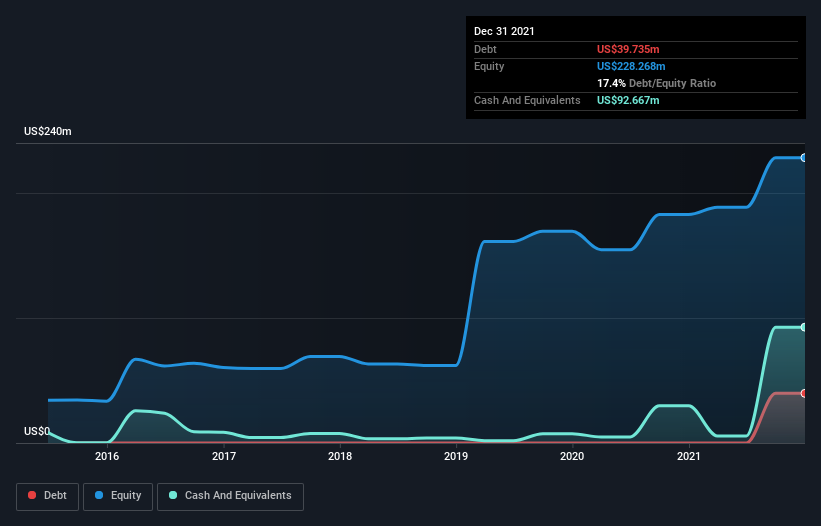Does Pantheon Resources (LON:PANR) Have A Healthy Balance Sheet?
The external fund manager backed by Berkshire Hathaway's Charlie Munger, Li Lu, makes no bones about it when he says 'The biggest investment risk is not the volatility of prices, but whether you will suffer a permanent loss of capital.' It's only natural to consider a company's balance sheet when you examine how risky it is, since debt is often involved when a business collapses. As with many other companies Pantheon Resources Plc (LON:PANR) makes use of debt. But is this debt a concern to shareholders?
When Is Debt Dangerous?
Debt and other liabilities become risky for a business when it cannot easily fulfill those obligations, either with free cash flow or by raising capital at an attractive price. Ultimately, if the company can't fulfill its legal obligations to repay debt, shareholders could walk away with nothing. However, a more common (but still painful) scenario is that it has to raise new equity capital at a low price, thus permanently diluting shareholders. By replacing dilution, though, debt can be an extremely good tool for businesses that need capital to invest in growth at high rates of return. The first thing to do when considering how much debt a business uses is to look at its cash and debt together.
View our latest analysis for Pantheon Resources
What Is Pantheon Resources's Net Debt?
As you can see below, at the end of December 2021, Pantheon Resources had US$39.7m of debt, up from none a year ago. Click the image for more detail. But it also has US$92.7m in cash to offset that, meaning it has US$52.9m net cash.
A Look At Pantheon Resources' Liabilities
We can see from the most recent balance sheet that Pantheon Resources had liabilities of US$4.58m falling due within a year, and liabilities of US$55.8m due beyond that. On the other hand, it had cash of US$92.7m and US$275.3k worth of receivables due within a year. So it can boast US$32.6m more liquid assets than total liabilities.
This short term liquidity is a sign that Pantheon Resources could probably pay off its debt with ease, as its balance sheet is far from stretched. Succinctly put, Pantheon Resources boasts net cash, so it's fair to say it does not have a heavy debt load! The balance sheet is clearly the area to focus on when you are analysing debt. But you can't view debt in total isolation; since Pantheon Resources will need earnings to service that debt. So when considering debt, it's definitely worth looking at the earnings trend. Click here for an interactive snapshot.
Given its lack of meaningful operating revenue, Pantheon Resources shareholders no doubt hope it can fund itself until it can sell some combustibles.
So How Risky Is Pantheon Resources?
By their very nature companies that are losing money are more risky than those with a long history of profitability. And in the last year Pantheon Resources had an earnings before interest and tax (EBIT) loss, truth be told. And over the same period it saw negative free cash outflow of US$33m and booked a US$8.2m accounting loss. With only US$52.9m on the balance sheet, it would appear that its going to need to raise capital again soon. Overall, its balance sheet doesn't seem overly risky, at the moment, but we're always cautious until we see the positive free cash flow. When analysing debt levels, the balance sheet is the obvious place to start. However, not all investment risk resides within the balance sheet - far from it. For example, we've discovered 3 warning signs for Pantheon Resources (1 makes us a bit uncomfortable!) that you should be aware of before investing here.
If, after all that, you're more interested in a fast growing company with a rock-solid balance sheet, then check out our list of net cash growth stocks without delay.
Have feedback on this article? Concerned about the content? Get in touch with us directly. Alternatively, email editorial-team (at) simplywallst.com.
This article by Simply Wall St is general in nature. We provide commentary based on historical data and analyst forecasts only using an unbiased methodology and our articles are not intended to be financial advice. It does not constitute a recommendation to buy or sell any stock, and does not take account of your objectives, or your financial situation. We aim to bring you long-term focused analysis driven by fundamental data. Note that our analysis may not factor in the latest price-sensitive company announcements or qualitative material. Simply Wall St has no position in any stocks mentioned.

 Yahoo Finance
Yahoo Finance 
